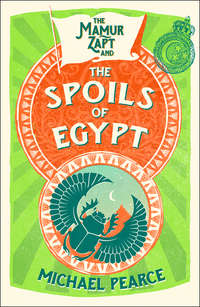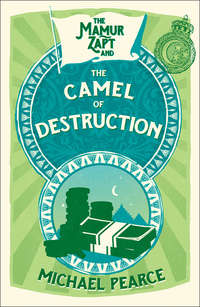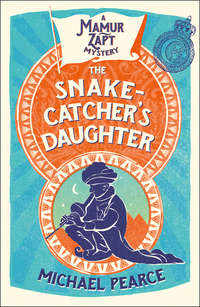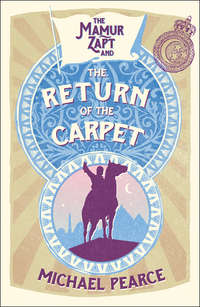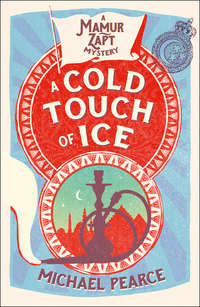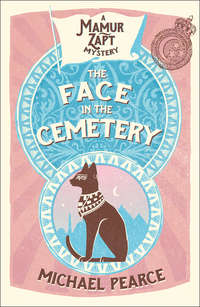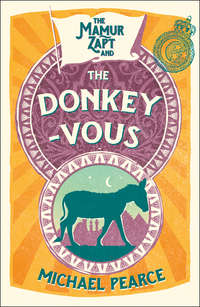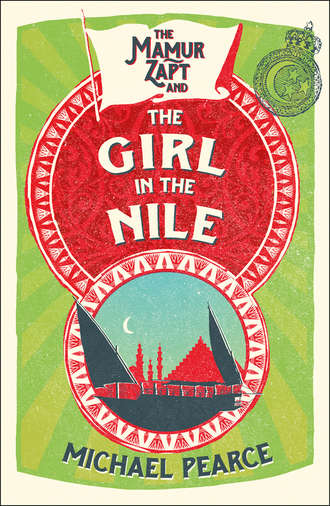
Полная версия
The Mamur Zapt and the Girl in Nile

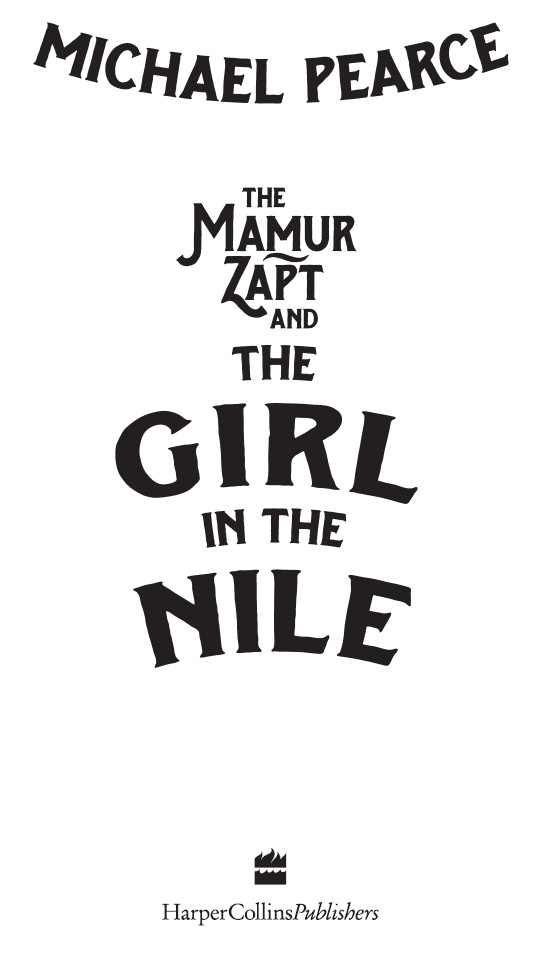

HarperCollinsPublishers Ltd.
1 London Bridge Street
London SE1 9GF
www.harpercollins.co.uk
First published in Great Britain by HarperCollinsPublishers in 1991
Copyright © Michael Pearce 1992
Michael Pearce asserts the moral right to be identified as the author of this work.
A catalogue record for this book is available from the British Library
This novel is entirely a work of fiction. The names, characters and incidents portrayed in it are the work of the author’s imagination. Any resemblance to actual persons, living or dead, events or localities is entirely coincidental.
All rights reserved under International and Pan-American Copyright Conventions. By payment of the required fees, you have been granted the non-exclusive, non-transferable right to access and read the text of this ebook on screen. No part of this text may be reproduced, transmitted, down-loaded, decompiled, reverse engineered, or stored in or introduced into any information storage and retrieval system, in any form or by any means, whether electronic or mechanical, now known or hereinafter invented, without the express written permission of HarperCollins ebooks
HarperCollinsPublishers has made every reasonable effort to ensure that any picture content and written content in this ebook has been included or removed in accordance with the contractual and technological constraints in operation at the time of publication
Source ISBN: 9780008259396
Ebook Edition © JULY 2017 ISBN: 9780008257248
Version: 2017-09-04
CONTENTS
Cover
Title Page
Copyright
Chapter 1
Chapter 2
Chapter 3
Chapter 4
Chapter 5
Chapter 6
Chapter 7
Chapter 8
Chapter 9
Chapter 10
Chapter 11
Chapter 12
Chapter 13
Footnote
Keep Reading
About the Author
Also By
About the Publisher
CHAPTER 1
‘But,’ said Owen, ‘where is the body?’
‘Ah yes,’ said the watchman, rubbing one horny foot up and down his shin.
‘Ah yes,’ said the corporal, shuffling uneasily:
Owen waited.
‘Well,’ said the corporal at last, looking out over the river to where a low mud shoal raised its back above the water, grey and wrinkled like a hippopotamus, ‘it was there.’
‘Well,’ said Owen, ‘it’s not there now.’
It had been a long, hot, fruitless morning. And now this!
He boiled over.
‘If this is some joke—’
The watchman looked as if he was about to burst into tears.
‘But, effendi, it was there, I saw it.’
‘Or thought you did.’
‘Foolish man!’ said the corporal, swiftly switching sides. ‘It was all a dream.’
He gave the watchman a push. The watchman pushed him back.
‘It was no dream!’ he insisted. ‘I saw it with my own two eyes. A woman, on the sandbank.’
‘A woman!’ said the corporal. ‘There, what did I tell you! It is time you got another wife, Abu. Then you would stop having these foolish dreams.’
‘I saw it plainly. On the sandbank.’
‘You saw something plainly,’ said Owen.
‘It was a woman,’ insisted the watchman doggedly.
‘A heap of camel dung!’ scoffed the corporal.
‘In the middle of the river?’ said the watchman angrily.
‘Anyway,’ said Owen, ‘it’s not there now.’
‘It was there.’
‘Then what has happened to it?’
‘Perhaps,’ suggested the corporal, ‘the river has washed it away?’
Owen looked up and down the river. It stretched, broad and placid, to the horizon on both sides. Further on down, near to the city, a single felucca was gliding gracefully in towards the bank. It came to rest and then there was nothing else moving in the intense heat of the late morning Egyptian sun.
He scanned the water’s edge carefully. At this time of year, with the flood still some weeks off, the Nile had shrunk back into its bed, uncovering a wide strip of mud, now baked hard and dry and cracked like crazy paving. Far away he thought he could see some goats grazing. But there was no suspicious heap lying grounded in the shallows, no flotsam or jetsam at all. Anything that came ashore would be snatched up at once by thrifty beachcombers.
Under his feet a little floating clump of Um Suf, Mother of Wool, papyrus reed, torn loose from its moorings hundreds of miles to the south, nestled along the bank and came to rest against the shoal. Nestled and stuck. The current was not even sufficient to tug it loose again.
‘It can’t have!’ said the watchman angrily. ‘It was lying right up on the shoal.’
‘How did it get there, then?’ asked the corporal. ‘Did it jump up there like a fish?’
This was exactly the kind of non-issue that Owen didn’t want to get involved in. In fact, he didn’t want to get involved in any of this at all.
‘This isn’t anything to do with me,’ he said. ‘This is not for the Mamur Zapt.’
‘Quite right, effendi!’ said the corporal smartly. ‘Only a woman.’
That was not what he had meant.
‘This is a matter for the Parquet,’ he said.
This was an ordinary crime if ever he’d seen one. And ordinary crimes were handled by the Parquet, the Department of Prosecutions of the Ministry of Justice. The Egyptian legal system was like the French. Conduct of a criminal investigation was the responsibility of a prosecuting lawyer, not of the police. The police worked under his direction. And, of course, when a crime was reported they were the ones who had to notify the Parquet in the first place.
‘Has the Parquet been notified?’ he said sternly.
The corporal scratched his head.
‘I expect so,’ he said.
‘Expect so?’ Owen boiled over with fury. ‘I should bloody well expect so, too. And I’d expect them to be here. I’d expect them to be wasting their time on this foolish nonsense and not me. Whose idea was it to send for the Mamur Zapt anyway?’
‘I don’t know anything about it,’ said the corporal hurriedly.
‘One said that you were near, effendi,’ said the watchman forlornly, ‘and the Chief thought—’
Owen knew damned well what the District Chief had thought. He had thought, here was somebody senior he could pass responsibility to without having to do anything about it himself. Right on the spot, too! He wouldn’t even have to stir out of the cool of his office. While he, Owen, was tearing around all over the place like a bloody lunatic!
‘Tell the Chief,’ he said ominously, ‘that I’ll be wanting a word with him.’
This was ridiculous. He couldn’t afford to be spending his time here. He had a dozen men on the other side of town waiting for him. They had been about half way through when the message had come from the District Chief. He had dropped everything and left. And you could bet that the moment he’d left they’d sat down in the shade.
He set off back up the bank.
After a moment’s hesitation the other two ran after him.
‘Effendi! Effendi!’
‘You stay here. Wait for the Parquet. You can tell it all to them.’
He reached the top of the bank, lizards scattering out of the way in front of him. He was just about to plunge back into the streets when he saw someone running towards him. It was one of the men he had left.
‘Effendi!’ he gasped. ‘A message! From the Bimbashi!’
‘Yes?’
‘You are to go to the river.’
Owen looked round. Behind him the river sparkled placidly in the sun. Apart from the corporal and the watchman, there wasn’t a soul in sight. Nothing moved on the bank or out on the water. The mud shoal and its hump dozed tranquilly in the heat.
‘Well,’ said Owen, ‘I’m at the river. But why on earth …?’
The Bimbashi arrived shortly afterwards.
He was in a motor-car. This was impressive since there were relatively few cars in Cairo in 1909 and the police force itself did not boast one. Normally it went about its business either on foot or in an arabeah, the horse-drawn cab distinctive to the city. If it needed a car it borrowed the Army’s one.
But that was battered and sober: this one was new and, well, spectacular.
‘Green,’ said the driver of the car, noting with satisfaction Owen’s interest. ‘There was a bit of a fuss about that. The Mufti complained. But I said: “It’s almost the family colour, isn’t it?”’
The Bimbashi, McPhee, pink and fair and anxious, rushed forward.
‘This is Captain Owen, Prince. Owen, Prince Narouz.’
‘Ah!’ said the Prince. ‘The Mamur Zapt. You got here quickly. Efficient of you. But then—’ he smiled ambiguously—‘we know the Mamur Zapt to be efficient, don’t we?’
He was perhaps in his late, perhaps in his early thirties. All the males of the Khedive’s family tended to thicken out and age suddenly as they approached middle age. Owen knew from the title that this was a member of the Egyptian Royal Family but which of the Khedive’s numerous progeny it was escaped him for the moment.
The third person in the car was another Egyptian, definitely about thirty, slim and dressed, like the Prince, in a smart, European-style suit but with the usual pot-like tarboosh of the Egyptian professional on his head.
Owen knew who this one was. His name was Mahmoud el Zaki and he was one of the Parquet’s rising stars. They embraced warmly in the Arab fashion. They had worked together often and got on well.
The Prince and McPhee had walked on to the top of the bank and were standing looking down at the river.
‘What’s all this about?’ whispered Owen.
‘Don’t know. Someone else was going to do this one and then they suddenly switched me on to it.’
They joined the others.
‘What’s going on?’ Owen asked.
McPhee turned a concerned face towards him.
‘Something absolutely frightful has happened,’ he said. ‘The Prince was on a dahabeeyah last night coming back from Karnak and someone fell overboard.’
‘A woman?’
McPhee nodded.
‘As soon as we got the report we suspected—well, we knew, I suppose. She couldn’t swim.’
‘You got the report?’
‘The Prince phoned Garvin first thing this morning.’
Garvin was the Commandant of the Cairo Police force. McPhee was his deputy.
‘What about the Parquet?’
‘We got the report in the ordinary way,’ said Mahmoud. ‘At that stage it was just that a body had been found. I imagine,’ he said to the Prince, ‘that you yourself rang up later?’
‘After I had spoken to Garvin.’ The Prince hesitated. ‘You see, I didn’t want this to be … clumsily handled.’
‘Oh, of course not!’ said McPhee sympathetically. ‘The poor girl! And the family, of course!’
‘Yes. And the Khedivial connection.’
‘Of course. Of course.’
‘It could be embarrassing, you see. Politically, I mean.’
‘For you?’ asked Owen.
The Prince looked at him coolly.
‘For the Khedive. There is no particular reason why it should be. There is nothing, shall I say, to be embarrassed about. But you know what the Press is and people are. It could be used. Turned against the Khedive. Used to discredit him. Would the British Government want that, Captain Owen?’
‘Assuredly not. The Khedive is a valued friend and ally.’
Not only that. He was the façade which concealed the realities of British power in Egypt.
For while the Khedive was the apparent ruler of Egypt, the country’s real ruler, in 1909, was the British Consul-General. His rule was indirect and unobtrusive. The Khedive had his Prime Minister, his Ministers and his Ministries. But at the top of each Ministry, alongside each Minister, was a British ‘Adviser’ and all the key public posts were occupied by Englishmen.
Like the Commandant and Deputy Commandant of the Cairo Police.
Like the Mamur Zapt.
‘That’s what the Consul-General thought too,’ said the Prince. ‘I spoke to him this morning.’
‘We are to give whatever help we can,’ McPhee told Owen.
‘How far does the help extend?’ asked Owen.
The Prince smiled.
‘Not as far as you are evidently supposing,’ he said. ‘I appreciate that someone has died. The matter must be investigated and will be most ably, I am sure, by Mr el Zaki, here. If a crime has been committed—oh, negligence, say—those responsible must be punished. It’s all straight and aboveboard, Captain Owen, and Mr el Zaki’s involvement should be a guarantee of that.’
‘I have complete confidence in Mr el Zaki.’
‘Quite. But, you see, there is the other dimension too. The political one. The case needs to be handled from that point of view too. It needs to be … managed.’
‘I see. And you would like me to provide that management?’
‘Who better?’
Owen could think of lots of people he would prefer to see handling this particular case. Most people, in fact.
The Prince was watching his face.
‘It’s not as bad as all that,’ he said. ‘We’re not asking you to do anything you shouldn’t. It’s mainly a matter of controlling the Press.’
‘It’s not easy to control the Press on something like this. It’s bound to get out. In a foreign newspaper, perhaps.’
In cosmopolitan Cairo with its three principal working languages and at least a dozen other widely used ones people turned as readily to the overseas press as they did to the native one. More readily, for the former wasn’t censored.
‘That’s why I spoke of … management.’
‘I see.’
‘Good!’ said the Prince briskly. ‘Then that’s all sorted out.’
He looked down at the river bed below him.
‘Well,’ he said, ‘I suppose we ought to go down. You’ll be needing an identification.’
‘There’s just one thing,’ said Owen.
‘Not there?’ said the Prince incredulously.
‘Not there?’ echoed McPhee.
Mahmoud did not say anything but started immediately down the slope.
By the time they got there he was already talking to the watchman.
‘I don’t understand,’ said the Prince. ‘Are you saying that this is all a mistake?’
‘A body was reported,’ said Owen.
‘A false report?’
Owen shrugged.
The watchman fell on his knees.
‘It was true, effendi,’ he protested vehemently. ‘I saw it. I swear it. On my father’s …’
‘I begin to doubt,’ said the Prince coldly, ‘whether you had a father.’
The watchman swallowed.
‘It was there, effendi,’ he said, pointing to the shoal. ‘There! I swear it.’
‘Then where is it?’
The watchman swallowed again.
‘I don’t know, effendi,’ he said weakly. ‘I don’t know.’
‘The river, effendi,’ insinuated the corporal sotto voce. ‘It could be the river.’
Bur the Prince had already turned away.
‘This is awkward,’ he said.
‘It could have been somebody else,’ said Owen. ‘It needn’t have been the girl.’
‘The report was of a woman’s body.’
‘Another woman, perhaps.’
The Prince shrugged.
‘Unlikely, I would have thought. Unless you have women’s bodies floating down this part of the river all the time.’
‘Oh no, effendi,’ said the corporal hastily.
‘Awkward,’ said the Prince again. ‘It would have been much more convenient … Well, it must be somewhere. You’ll have to find it, that’s all.’
‘I’ll get on to it right away,’ promised McPhee. ‘I’ll alert all the police stations—’
‘Quietly,’ said the Prince. ‘If that’s possible with the police.’
‘There’s a bend below the city,’ said Mahmoud. ‘It will probably turn up there.’
‘Have someone looking out for it,’ ordered the Prince. ‘This needs to be handled discreetly.’ He looked at Owen. ‘You’re managing this. Remember?’
Owen and Mahmoud were left on the river bed.
‘Like it?’ said Owen.
‘No,’ said Mahmoud. ‘But then, there’s quite a lot I don’t like.’
He called the watchman over.
‘Come here,’ he said. ‘You saw the body. Describe it.’
‘It was a woman.’
‘Clothed?’
‘Of course!’ said the watchman, shocked.
‘It mightn’t have been. What was she wearing?’
The watchman looked down at his feet, embarrassed.
‘Shintiyan,’ he muttered.
‘Trousers?’ said the corporal, unable to restrain himself. ‘Oh ho, Abu, this is the stuff of dreams!’
‘Colour?’
‘Pink,’ muttered the watchman.
‘She was not a village woman, then?’
‘No, effendi.’ The watchman shook his head definitely.
‘What else was she wearing? A tob?’
The watchman hesitated.
‘I think so, effendi. It was hard to tell.’
The corporal guffawed.
‘He only saw the shintiyan!’
‘She wore something, though, apart from the shintiyan?’
‘Oh, yes, effendi. It was just the way she was lying,’ he said aside to the corporal. ‘That’s how I came to see them.’
The shintiyan were ordinary trousers, not undergarments, and came right down to the ankle.
‘How was she lying?’ asked Mahmoud.
The watchman lay down on the sand and put his arms together over his head. His body formed a kind of crescent.
‘There’s a hump on the shoal,’ he said. ‘She was lying round that.’
‘Show me.’
They splashed out to the shoal. The water was shallow and hardly came up their knees.
The shoal was some twenty feet long, and about four feet wide. At the downstream end it rose into a little hump.
‘She was lying round that,’ said the watchman. ‘Head that side, feet this.’
‘The body probably caught up against it on its way downstream,’ said Owen.
‘Well, yes,’ said Mahmoud. ‘Possibly. But you can see from the mud that normally the upper part of the shoal is above the water.’
‘The wash of a boat? The Prince’s boat?’
‘Possibly.’
Mahmoud examined the mud carefully.
‘We’ll have to get the trackers out here,’ he said. ‘I can’t see anything.’
‘Does it matter?’ asked Owen. ‘If anything happened, it happened on the boat. Where the body finishes up is neither here nor there.’
‘Yes,’ said Mahmoud. ‘Except that there’s one thing I find puzzling. I can accept that the body might have been carried high up on to the shoal by an exceptionally heavy wash from a boat. But I find it hard to believe in a second exceptionally heavy wash from a boat in the same morning—one so heavy as to carry the body off again.’
Owen had to go back to his men. He found them, as he expected, doing nothing. They were supposed to be carrying out an arms search. In fact, they were chatting peacefully in the shade.
He put them back to work. The tip had come from a reliable source. You didn’t waste things like that in his business.
According to his informant, the arms had come into the quarter the previous day. The consignment was substantial, at least two donkey-loads. It would be hidden in the quarter until the necessary deals were struck and the arms could be distributed.
For a consignment as large as that hiding-places were limited. The houses in this poor part of town were single-storey, one-room affairs and there was seldom any furniture in the room. The men would simply come into the room, stand and look.
Usually they concentrated their attention on the roof. The roofs were flat and used for storage: onions, maize stalks, cattle dung being dried out for fuel, firewood.
It was under the firewood that arms were usually hidden. The men would run up the outside staircases and make straight for that.
By now, though, the sun was directly overhead and on the roofs it was unbearably hot. It was hot even to step on them. The men winced as their bare feet touched the plaster and Owen could feel the heat even through the soles of his shoes.
That was the trouble about missing a couple of hours. If he had not been called away it would have been done by now.
The men were beginning to slow down. He went round chivvying.
Two men were taking a suspiciously long time on a roof. He went up to see what they were doing.
He had maligned them. They were working. Like many of the roofs, this one had a dovecot. It consisted of large earthenware pots stacked on top of each other on their sides so that the mouths all pointed one way like a battery of guns. The doves flew in at the mouths and made their nests inside.
The trouble was that a number of the birds were inside now and the constables, country boys, were conscientiously taking them out one by one before feeling around inside.
‘That’s all right,’ he said. ‘You don’t need to do that.’
‘You told us to check everything!’
‘Yes, but—’
He was forced to admit they were right. It could be a possible hiding-place. Though only for pistols.
‘Don’t do them all,’ he said. ‘Just try a few. Otherwise you’ll be here all day.’
‘We don’t want to miss anything,’ one of them said, reaching unhurriedly into another pot.
‘Yes, but we want to get a move on.’
‘Sure!’ they agreed equably.
They were some of the men he had borrowed from the local District Chief. Out here on the edge of the city life was still close to that of the village and the pace was very different from what it was further in.
He thought it would probably confuse them if he insisted on their moving on. Instead, hoping to expedite matters, he squatted down beside them and gave them a hand.
In the relaxed way of countryfolk, they began to chat.
‘Did you find what you wanted over there?’ asked one of them, inclining his head in the direction of the river.
Over the houses Owen caught a glimpse of blue.
‘No.’
‘Nor here, either. You’re not having much luck this morning, are you?’
‘There’s still time. If we get a move on,’ he said pointedly.
‘Oh yes. Things usually turn out right in the end.’
‘Yes, but only if—’
He stopped himself. It was pointless. One of the things he had learned since coming to Egypt was that the country had its rhythms and that if you were going to get anywhere you had to work with them and not against them.
‘It was a body,’ he said, changing tack. ‘Over there. By the river.’
‘Oh yes.’
‘Yes. Or rather, a body was reported. By the time I got there it had gone.’
The man laughed.
‘Bodies have a way of doing that,’ he said. ‘Or at least, on this part of the river they do.’
‘How’s that?’
‘Oh well, if you find one, that means more work for the Chief, doesn’t it?’
‘So he doesn’t mind too much if one goes missing?’
‘He doesn’t mind at all.’
‘How might they go missing?’
‘All sorts of ways,’ said the man vaguely.
‘They might hit a pole, for instance,’ suggested his friend.
‘What?’
The two men laughed, as at a private joke.
‘They can hit all sorts of things on their way downriver,’ said the first man, looking at his friend chidingly.
‘But what about when they’re washed up?’
‘That’s when they have to be reported.’
The man laughed again.
‘Are there people working the bank?’
‘How do you mean?’
‘On the lookout for things. Things that get washed ashore?’


